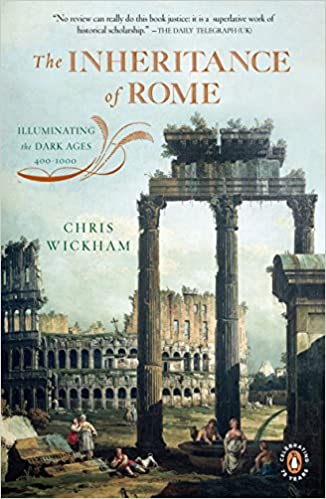Wickham, Chris. The Inheritance of Rome: Illuminating the Dark Ages, 400-1000. New York: Penguin, 2009.
Over the past couple years, my reviews here on Concerning History have covered a wide range of topics; regular readers, however, might notice a few patterns. Naturally, I gravitate towards books on empire, especially the British Empire, as a result of my own historical specialty. Another concentration, however, has been on ancient history, particularly the periods known as Late Antiquity and the Early Middle Ages. This generally has been a result of my own amateur interest in them, but more specifically, these books and resulting reviews have been the consequence of a very specific personal drive: my hunt for a good, modern, approachable general history of the period encompassing the fall of Western Rome and the rise of Medieval Europe. I am pleased to announce that, at long last, I have found my prize in Chris Wickham’s The Inheritance of Rome.
Late Antiquity and the Early Middle Ages, often known collectively as the “Dark Ages,” are endlessly fascinating for me for two main reasons: they hold within them the death of the ancient European order and the birth of the world as we know it, and the sources we have for such a seminal period are relatively sparse compared to other, better documented eras. This is precisely where Wickham begins his history, explaining to his readers the historiography and public memory of his subject. He dispels the myth of a total lack of sources, instead explaining the types of records available along with the benefits and drawbacks of each. He also commits to examining his subject both on its own merits—not holding modern (or even High Medieval) Europe as a foregone conclusion—and in its full, proper continental context—looping Byzantium and the rise of Islam back into the historical narrative of the Dark Ages. When taken as a whole, Wickham’s approach brings the Dark Ages to light as I’ve rarely seen it before.
While he attempts to avoid any kind of determinist analysis, Wickham still offers satisfying narrative threads and themes through which to understand this formative historical era. The collapse of Western Rome and survival of Eastern Rome is analyzed in light of that argument’s rich historiographical tradition, with even some relatively new additions (it’s now hard for me to under-emphasize the importance of the loss of North Africa in my own analysis of the period). Similarly, his recurring treatments of common life and freedom of the peasantry alongside evolving notions of legitimacy and noble power base simultaneously demonstrate the myriad systems of governance during the early Middle Ages and how late true Feudalism can be said to have been implemented in Western Europe (in fact, after the period covered by The Inheritance of Rome).
Wickham’s approach is not without flaw, however. At times, I found myself arguing with him (though admittedly, in the best of ways). This occurred most often when his conclusions strayed too far into removing his subject matter from the flow of history. In particular, his assertion that Western Rome in AD 400 was a perfectly healthy state, with no apparent flaws in its system, rings hollow in light of its previous 2 centuries of constant civil wars and its future complete collapse in the next 76 years; it feels like Wickham has taken his ‘on its own merits’ analysis slightly too far.
These are the most scholarly of complaints, however, and I cannot recommend The Inheritance of Rome enough. I generally think Late Antiquity is an underserved and understudied historical era; Wickham’s work is precisely the kind of accessible, engaging history to rectify that situation. At nearly 600 pages, it might not be light summer reading, but anyone who ventures into Wickham’s narrative will find their understanding of history forever altered for the better.
